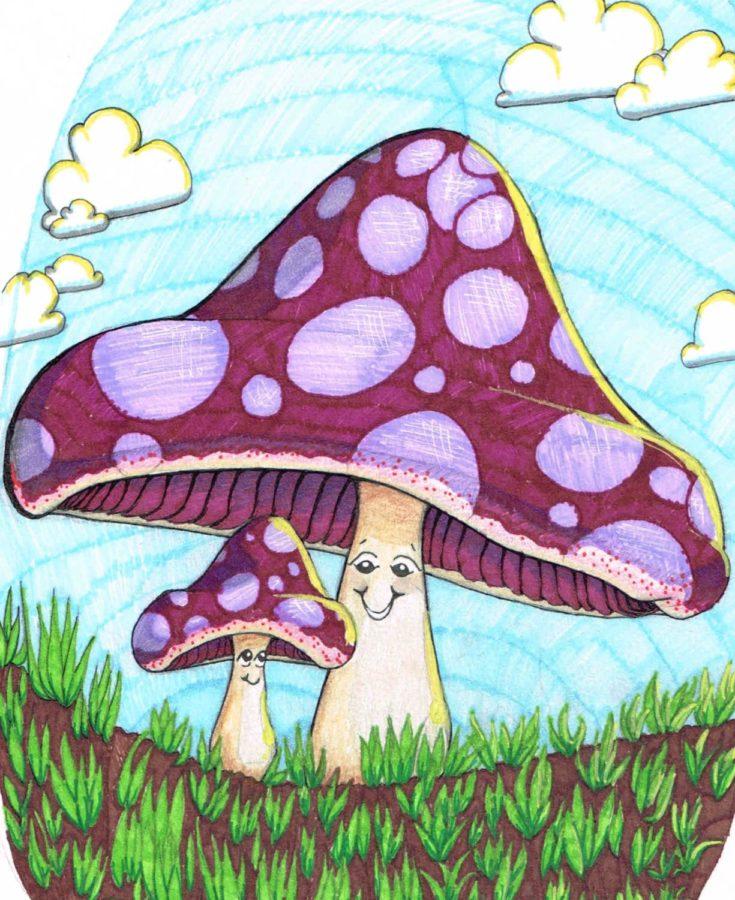Brown: Make room for mushrooms!
Columnist Aaron Brown argues for the decriminalization of mushrooms and psychedelic substances found in nature.
January 24, 2022
A century ago, anyone with a dime or a quarter could walk into a drug store and walk out with some cough syrup containing alcohol, cannabis, chloroform and morphine. Dictator Roosevelt put an end to that with the Federal Food, Drug, and Cosmetic Act in 1938. Also gone are the days of an eight-year-old buying over-the-counter codeine cough syrup. Before the 1970s, all one had to do was sign a log and write down what they purchased. The 1970s also brought America the outlawing of many species of mushrooms. Silly people thought they could fix man’s heart by controlling what entered his mouth.
Apparently, we got bored after decades of regulating the Plantae division of creatures and moved on to Fungi. (Interestingly enough, the ban on mushrooms happened right as fungi got their own taxonomic kingdom.) What has happened since the seventies is an explosion in prison populations. The number of people in prison for drug offenses has jumped from 41,000 in 1980 to 431,000 in 2019. Perhaps you are thinking that more people are in prison because there are simply more people walking around. Be reminded that the population of the U.S. has increased 46 percent since 1980, not 950 percent. Almost half of federal inmates are doing time for a drug offense.
Thus, the prison problem in the United States is directly connected to drug laws. Iowa does pretty good compared to most other American states. The per capita rate of incarceration of Iowans is lower than in 33 other states, but Iowa does worse than any other nation in the world. Discussing the problems with American justice systems is for another article, though.
In the U.S., dozens of states have partially decriminalized or legalized cannabis. In a handful of countries, you can grow coca plants without any trouble. For six nations, the growing, possession, sale or transport of mushrooms is no longer illegal. Some people have realized the folly of fining and confining others for having plants (and fungi) created for our benefit long ago. “Created for our benefit” is a description many might find absurd. Marijuana is the most popular “medicine” that everyone likes to discuss. Did you know that right next door, Stepan Company in Illinois is the only company authorized by the DEA to import coca leaves? They remove the cocaine to make an extract for Coca-Cola and ship the cocaine to Mallinckrodt Pharmaceuticals to make medicine. But what about psychedelic mushrooms? Shrooms just make you hallucinate that people are trying to kill you and fry your brain, right?
More than 180 kinds of mushrooms contain a chemical compound called psilocybin. Psilocybin is a prodrug, meaning the human body transforms it from an inert substance into something that affects the body. These mushrooms have been used by all sorts of groups of people across Asia, Europe and the Americas, back a few millennia B.C. It was not until the A.D. 1900s that these mushrooms and psilocybin became known to empirical science. We now know exactly what part of the mushroom affects your brain.
Like alcohol or caffeine, or other legal substances, if you use psilocybin at the wrong place or at the wrong time or in the wrong amount, there will be problems. But used in the right place, at the right time and in the right amount, there are veritable benefits. In 2016, John Hopkins published the results to a study of cancer patients. The study was double-blind, meaning the subjects and administrators were both unaware of who got a placebo and who got the psilocybin. An overwhelming majority of patients had reduced depression. Both the patients and their doctors noticed it.
It was not just a one-off occurrence. Dr Griffiths says “psilocybin can consistently produce positive changes in mood,” and other studies have found similar results. In a study in the United Kingdom, a dozen people with depression who had tried other treatments unsuccessfully were given psilocybin. Only one patient experienced paranoia, something heavily associated with psychedelic mushrooms, and it was “mild and transient” according to the researchers. After three months, only one patient came back and said they still had depression. Nobody had recurring nightmares. Nobody became schizophrenic. Nobody became a vegetable. Michael Stevens (of Vsauce) took psychedelics in 2017 and still makes great videos!
As somebody who has never smoked a bowl, done a line or taken a trip, I may seem an unlikely advocate for drug legalization. I’ve never grown, bought, sold, transported or consumed any kind of illegal narcotic. None of my relatives are doing life in prison for selling some plants. The only drugs my friends consume are caffeine, alcohol and nicotine. Why should I care about magic mushrooms? Well, that also is for another article. Suffice it to say, I have discovered repugnant injustices in the way people treat their neighbors.
The War on Drugs has failed and will fail, yet will continue as long as we perpetuate it. It is time to free ourselves from superstitious laws. Mushrooms were banned very much because they were related to counter-cultural movements. A man is responsible for choosing what he consumes. Parents are responsible for what children consume. The state has no business in telling people what they can and cannot use for medicine.
“They sow the wind and reap the whirlwind.” Those who abuse the gifts they are given will suffer consequences. You are free to shun such people or offer them aid. You are right to persuade abusers of drugs to flee their temptations. But to lock people in cages for growing, trading and consuming natural organisms is neither right nor helpful. Oregon and a few U.S. cities are leading the way in decriminalizing Psilocybe. It’s time to make room for mushrooms.

















